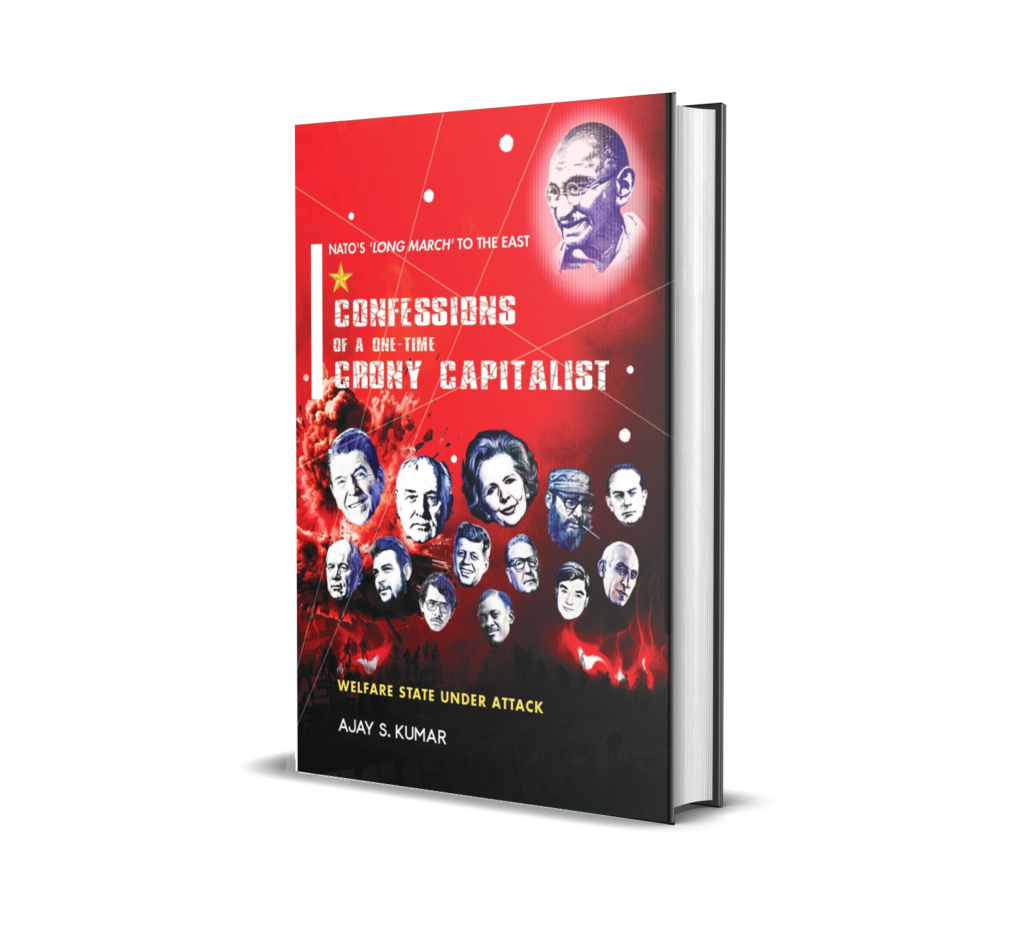Discover the Shocking Truths Behind Global Power Dynamics: A Riveting Exploration

In “Confessions of a One-Time ‘Crony Capitalist’,” the author unveils the hidden mechanics of our contemporary world, challenging the deeply held beliefs of the common man. Set against the dramatic backdrop of NATO’s ‘long march’ from the Atlantic to the Black Sea, this book is a fierce critique of the global capitalist order.

Discover the Shocking Truths Behind Global Power Dynamics: A Riveting Exploration
In “Confessions of a One-Time ‘Crony Capitalist’,” the author unveils the hidden mechanics of our contemporary world, challenging the deeply held beliefs of the common man. Set against the dramatic backdrop of NATO’s ‘long march’ from the Atlantic to the Black Sea, this book is a fierce critique of the global capitalist order.
A Journey Through Imperialism
The author compellingly argues that colonialism, the Cold War, and neoliberalism are merely different stages of imperialism. Free from ideological biases that often cloud discussions on global politics, the book offers an unflinching, objective look at our world. It invites readers with open minds to explore alternative possibilities and solutions.
A Journey Through Imperialism
The author compellingly argues that colonialism, the Cold War, and neoliberalism are merely different stages of imperialism. Free from ideological biases that often cloud discussions on global politics, the book offers an unflinching, objective look at our world. It invites readers with open minds to explore alternative possibilities and solutions.
Colonialism: The Roots of Modern Dependence

The book traces the near-permanent reliance of temperate regions on tropical resources, leading to the rise of colonialism—the earliest and most visible form of imperialism. Even after formal colonial rule ended, imperial powers retained their grip through political and economic influence. The former colonies were to be on a leash from the metropole. A very short leash indeed.
Cold War: A Clash of Ideologies

As the Soviet Union rose as an alternative to capitalism, it threatened the capitalist world order. Despite the Great Depression crippling capitalist nations, the Soviet model that incorporated scientific planning to improve lives demonstrated significant progress. This period saw the emergence of welfare states in capitalist countries, albeit reluctantly. The Cold War, with its imperialistic undertones, saw the capitalist West trying to destabilize any government opposing its agenda, often labelling nationalism as a front for communism. The author highlights how democratically elected leaders like Mohammad Mossadegh in Iran, Jacobo Arbenz of Guatemala and Salvador Allende in Chile were overthrown to protect the interests of the Capital.
Neoliberalism: The New Face of Imperialism

The book delves into how leaders like Ronald Reagan and Margaret Thatcher systematically dismantled welfare states, paving the way for neoliberalism. The collapse of the Soviet Union in the early ’90s removed the last major obstacle to the unchecked advance of global capitalism, turning the world into a playground for Capital.
A Compelling Vision for the Future

“Confessions of a One-Time ‘Crony Capitalist’” is not just a critique but a call to action. It challenges readers to envision and work towards a society where wealth is not concentrated in the hands of a few but shared for the common good. This book is a must-read for anyone seeking to understand the complexities of global power dynamics and the path to a more just and equitable world.
The Urgent Call for Change

Mere knowledge of the forces at work will give us the power to predict. Good will, noble aspirations and rhetoric will serve no purpose to undo the wrongs unless it is backed by an action plan. The book emphasizes the need for knowledge and action to counter these forces. The author calls for a return to welfare policies and urges the restoration of true participatory democracy, where citizens have a genuine voice in government decisions.
About The Book



About The Book

“Those who control the present, control the past and those who control the past control the future”
This book is an attempt to discern the pattern of capital’s repeated and very often successful attempts to dismember the welfare state. Written against the backdrop of NATO’s ‘long march’ to the East, Confessions of a one-time crony capitalist, seeks to unshackle the layman’s mind which had come to be highly conditioned by a schema that is fundamentally erroneous much to the detriment of his own capacity to dream let alone attempt to build a secure future on this planet.
Any form of government which has the potential to be a bulwark against the onslaught of capital, run the risk of being targeted. The machinations of the CIA in destabilizing even the nationalist governments of the third world, which chose to be non-aligned and refused to be a part of the socialist bloc during the hey days of cold war, is a point often missed. CIA which in almost practical purpose expands to Capital In Action(!) viewed “nationalism as a trojan horse for communism”. Capital in its attempt to aggrandize to itself the ‘wealth of nations’ brook no attempt for “pursuit of happiness” of the citizenry of a nation.
Wither Welfare state?
In “Confessions of a One-Time Crony Capitalist,” the author embarks on a revealing journey to uncover the persistent and often successful efforts of Capital to dismantle the welfare state. Set against the backdrop of NATO’s ‘long march’ from the Atlantic to the Black Sea, this book seeks to liberate the layman’s mind from a fundamentally flawed schema that hinders our collective ability to dream and build a secure future.
The book highlights how any government capable of resisting the advance of Capital becomes its target. The covert operations of the CIA to destabilize nationalist, non-aligned governments during the Cold War are often overlooked but crucial in understanding this dynamic. The CIA, seen here as "Capital In Action," perceived nationalism as a trojan horse for communism. Capital's relentless quest to monopolize the ‘wealth of nations’ disregards the well-being and happiness of a nation's citizens.
With the advent of international finance, Capital lost its national character, rendering national governments subservient to the custodians of Capital. Unlike the colonial era, where native financial custodians supported freedom movements, the neoliberal era sees the native financial class aligning with international finance, often at odds with their own national governments.
"Nature can provide for everyone’s need, but not for anyone’s greed."
The author calls for a profound understanding of these forces. Goodwill and noble aspirations are insufficient without an actionable, well-informed plan. The book urges a return to welfare policies and advocates for true participatory democracy, where citizens reclaim their rightful place in government decision-making. An enlightened population demanding authentic democracy, beyond mere procedures, is essential.
History will judge us for failing to harness our intellectual energies to establish a welfare state. "Confessions of a One-Time Crony Capitalist" is not just a critique but a clarion call to restore the welfare state and ensure a fair, equitable society. This book is a must-read for those seeking to understand and challenge the dynamics of global power.
Join the Movement
Engage with this eye-opening narrative and be part of the movement for change.
Get your copy today and help pave the way to a brighter, more equitable future.
Amazon
Flipkart
Google book
Ziffy bees
Meet the author



Meet the author

Ajay S. Kumar was born in Nigeria to Indian parents. He was raised in India. The upheavals in Eastern Europe and the disintegration of the Soviet Union towards the end of the millennium had a great impact on the Third World in general and India, in particular. The gospel of Neoliberalism found many a devotee in his country, the author himself being one. Confessions of a One-Time Crony Capitalist, written against the backdrop of the ‘long march’ of NATO to the east, is his response to the machinations of capital. The author stresses the need to reinsti- tute the social contract between the government and the people it professes to represent. He makes a case for social economy so that the citizen is the sovereign of his circumstance.
Subscribe Now...
Thank you for taking the time to look at our website! Subscribe the newsletter to be notified when my new book is available and to receive special offers.